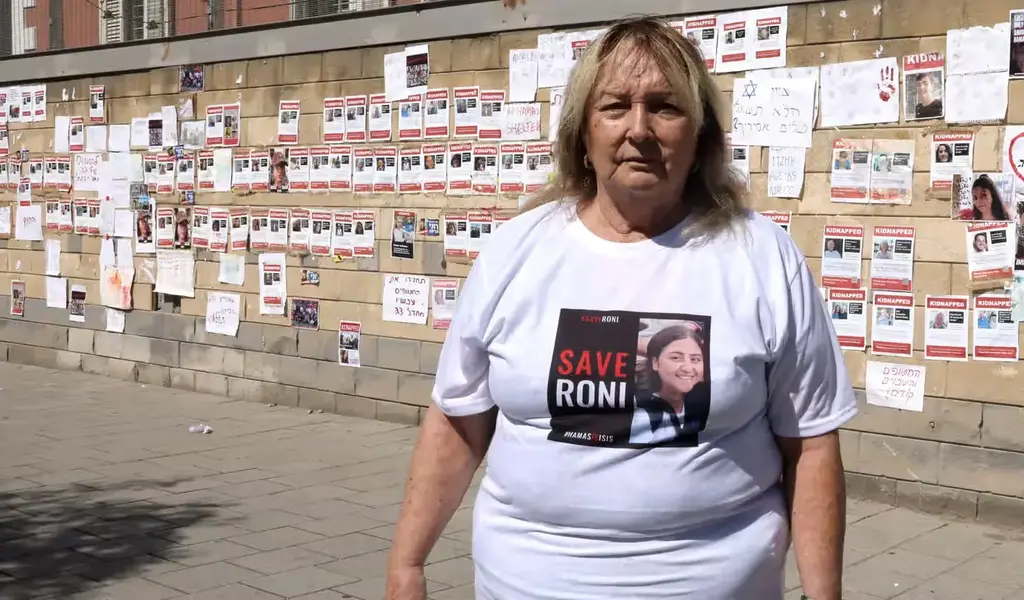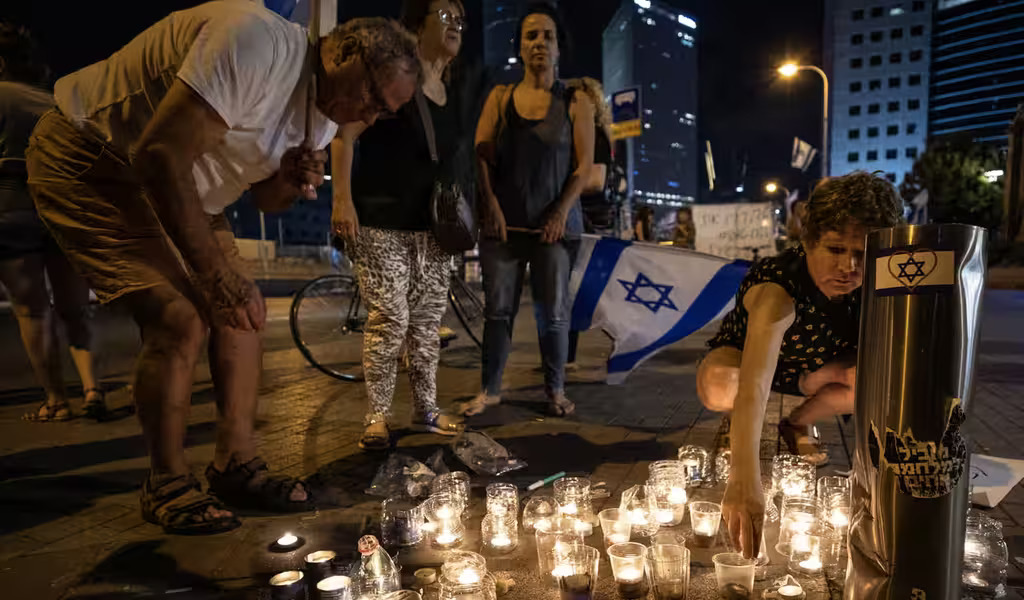News
Israel Divided Over Netanyahu’s Handling of Hostage Situation

(CTN NEWS) – Wearing a T-shirt adorned with her missing granddaughter’s smiling face, Roni Eshel’s grandmother, Zehava Eshel, addressed a gathering of protesters outside the Israeli military headquarters in Tel Aviv.
She expressed her disappointment, saying, “The country was supposed to protect her.”
The Israeli military has categorized 19-year-old Roni Eshel, who served as an IDF soldier near the Nahal Oz kibbutz, as a missing person.
The Eshel family’s knowledge is limited to Roni’s last text to her mother, sent from a friend’s phone in the early hours of Saturday, October 7, during the unprecedented incursion by Hamas militants, which has tragically claimed over 1,300 Israeli lives.
Since that time, Zehava Eshel described how the family has received minimal information.
She asked, “Where is the state?” expressing frustration at the lack of communication from the Israeli military and the government.
Roni Eshel and soldiers like her, stationed near the fortified three-layer fence surrounding the Gaza Strip, were intended to serve as “the eyes of the country,” her grandmother explained.
However, it appears that their warnings about unusual border movements went unheard, especially as much of the Israeli military had been deployed to the West Bank.
Zehava Eshel further questioned the whereabouts of the ministers, the prime minister, and high-ranking officers in this trying time.
Roni Eshel is believed to be one of approximately 199 hostages held by Palestinian militants from Hamas and Islamic Jihad in Gaza.
Her grandmother, alongside other families with missing loved ones, attended a protest on Tuesday, demanding government action to secure their release, which could involve potential prisoner exchanges for thousands of Palestinians imprisoned in Israeli jails, as demanded by the captors.
Close by, a woman, visibly emotional, held a sign that read “Bring them home,” while another sign on a nearby tree stated “Prisoner exchange now,” next to a prominent Israeli flag.
The flag fluttered in the breeze, accompanied by a yellow ribbon tied around the tree trunk.
The Israeli public is deeply divided over the government’s handling of this significant breach of security, with the issue of the hostages becoming a focal point for criticizing Benjamin Netanyahu’s response to the crisis.
While many families are cautious in their criticism, fearing that being too vocal could hinder the government’s responsiveness to their needs, some of their supporters gathered in Tel Aviv, contending that the Prime Minister’s prioritization of striking Hamas over securing the hostages is another reason for him to step aside, after a combined 16 years in power.
Tzvia Shmuelvich, a veteran of the Israeli military during the 1973 war against a coalition of neighboring states, stated, “Even the head of the army, the chief of the Shin Bet (domestic intelligence service), said, ‘we are guilty, we take responsibility, we admit we are to blame’—that they failed. But Netanyahu, he never fails.”
She added, “A lot of people say it’s not the time for a new leader, and we say it is. It’s not politics; every day he continues as Prime Minister, we lose more people.”
Holding a sign that read “He’s unfit” in Hebrew, she contended that Netanyahu was more likely to consult his supporters in his Likud party to decide the next steps rather than considering the sentiments of the hostages and their families.
Itamar Gavi, holding a sign that said “Guilty,” voiced his belief that Netanyahu is leading Israel into a very dark place.
Other veterans of Israel’s compulsory military service joined in the criticism, with one man stating, “He caused the problem,” while overhearing discussions about the increasingly right-wing Israeli government, which many on the left see as influenced by religious and extremist settler groups.
“He isn’t just the cause of the problem; he is the problem,” remarked Avi Gopher. “Israel is in dire need of a change. Every moment he remains in power is a growing concern.”
The Prime Minister’s response to the crisis has primarily focused on targeting Hamas, including an ongoing assault on the Gaza Strip that has resulted in over 3,000 casualties and 12,500 injuries so far.
A spokesperson for Hamas’ military wing, the al-Qassam brigades, claimed earlier this week that at least 22 of the Israeli hostages had been killed in the bombardments.
The Prime Minister met with some of the hostages’ relatives more than a week after the crisis began, but he faced criticism for allegedly selecting only families supportive of his party to attend.
His office, however, refuted allegations that some of the families were “planted,” calling such claims “false, shocking, outrageous, and unacceptable.”
The Israeli government has staunchly opposed negotiating with Hamas to secure the hostages’ release, a stance supported by some of the hostages’ relatives.
Tzvika Mor, who participated in the meeting with Netanyahu to discuss his missing son, Eitan, expressed a preference for attacking Gaza over engaging in hostage negotiations.
He stated, “We wanted to convey a national message to Netanyahu. We need to stop this whining behavior.
In a time of war, the people of Israel have to make sacrifices, even when our children are there, and prevail.”
Further down the boulevard near the military headquarters, Ori Plasse, despite his criticisms of the security breach, manned a tent in support of the families of captives who did not favor negotiations.
Plasse stated, “I think the Prime Minister is dreadful; he hasn’t inspired any sense of security in people.”
Nevertheless, he believed that Netanyahu and the Israeli government should not yield to the demands of certain families and should resist public pressure to negotiate for the hostages’ freedom.
He advocated a policy of “no negotiation, and continuing the operation to the end.”
Plasse’s perspective was shaped by his support for his wife’s family, members of a group of Israeli settlers evicted from the Gaza Strip in 2005.
Regarding the families further down the street demanding hostage negotiations, he said, “They’re parents, and I don’t think they are selfish.
But for them to expect the government and the IDF to prioritize their needs is selfish because it might put others in a similar situation in the future.
This has to be the end. Now has to be a wake-up call. Most Israelis share the same opinion; they want to see Hamas eliminated.”
MORE RELATED NEWS:
Terror Strikes Sweden: Shocking Truth Behind Recent Attacks And Freedom Of Speech Debate
China’s Belt And Road Initiative (BRI) Adapts Towards Smaller And Greener Projects
U.S President Biden’s Solidarity Visit To Israel Amidst Humanitarian Crisis In Gaza
India’s Supreme Court Rejects Legalization Of Same-Sex Marriage, Sparks Disappointment And Debate
El Deif, The Alleged Mastermind Of The Hamas Attack: What You Need To Know






























